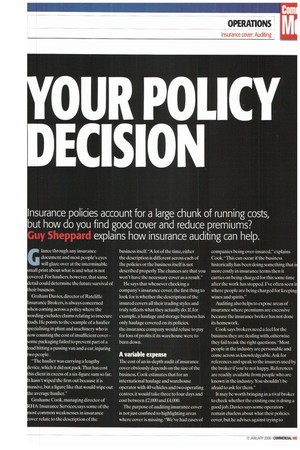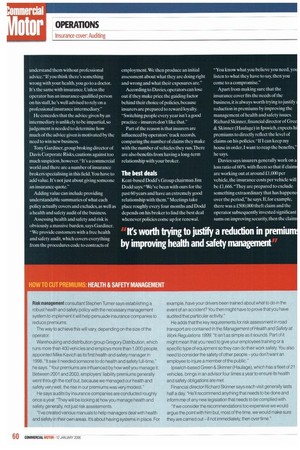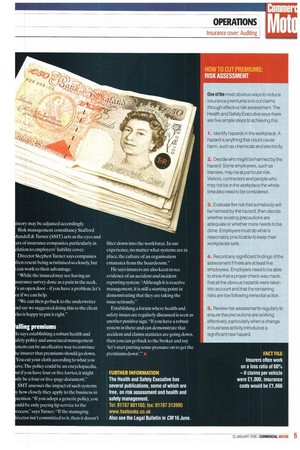OUR POLICY EC S 01•1
Page 59

Page 60

Page 61

If you've noticed an error in this article please click here to report it so we can fix it.
nsurance policies account for a large chunk of running costs, ut how do you find good cover and reduce premiums?
uy Sheppard explains how insurance auditing can help.
lance through any insurance document and most people's eyes will glaze over at the interminable mall print about what is and what is not overed. For hauliers, however, that same etail could determine the future survival of heir business.
Graham Davies, director of Ratcliffe nsurance Brokers, is always concerned 'hen coming across a policy where the ording excludes claims relating to insecure ads. He points to the example of a haulier pecialising in plant and machinery who is ow counting the cost of insufficient cover mile packaging failed to prevent part of a ad hitting a passing van and a car, injuring wo people.
"The haulier was carrying a lengthy evice.which it did not pack.That has cost his client in excess of a six-figure sum so far. t hasn't wiped the firm out because it is assive,but a figure like that would wipe out he average haulier."
Grahame Cook, managing director of HA Insurance Services,says some of the ost common weaknesses in insurance ver relate to the description of the business itself. "A lot of the time,either the description is different across each of the policies or the business itself is not described properly. The chances are that you won't have the necessary cover as a result."
He says that whenever checking a company's insurance cover, the first thing to look for is whether the description of the insured covers all their trading styles and truly reflects what they actually do. If, for example, a haulage and storage business has only haulage covered on its policies, the insurance company would refuse to pay for loss of profits if its warehouse were to burn down.
A variable expense 'he cosi of an in-depth audit of insurance cover obviously depends on the size of the business. Cook estimates that for an international haulage and warehouse operator with 40 vehicles and two operating centres, it would take three to four days and cost between /2,000 and /4.000.
The purpose of auditing insurance cover is not just confined to highlighting areas where cover is missing. "We've had cases of companies being over-insured," explains Cook. "This can occur if the business historically has been doing something that i more costly in insurance terms then it carries on being charged for this some time after the work has stopped. I've often seen it where people are being charged for keepin._ wines and spirits."
Auditing also helps to expose areas of insurance where premiums are excessive because the insurance broker has not done its homework.
Cook says brokers need a feel for the business they are dealing with,otherwise they fail to ask the right questions.-Most people in the industry are personable and come across as knowledgeable. Ask for references and speak to the insurers used by the broker if you're not happy. References are readily available from people who are known in the industry. You shouldn't be afraid to ask for them.
It may be worth bringing in a rival broker to check whether the existing one is doing a good job. Davies says some operators remain clueless about what their policies cover, but he advises against trying to understand them without professional advice."If you think there's something wrong with your health, you go to a doctor. It's the same with insurance. Unless the operator has an insurance-qualified person on his staff, he's well advised to rely on a professional insurance intermediary."
He concedes that the advice given by an intermediary is unlikely to be impartial, so judgement is needed to determine how much of the advice given is motivated by the need to win new business.
Tony Gardiner, group broking director of Davis Corporate Risks, cautions against too much suspicion, however. 'It's a commercial world and there are a number of insurance brokers specialising in this field.You have to add value. It's not just about giving someone an insurance quote."
Adding value can include providing understandable summaries of what each policy actually covers and excludes, as well as a health and safety audit of the business.
Assessing health and safety and risk is obviously a massive burden,says Gardiner. "We provide customers with a free health and safety audit, which covers everything from the procedures code to contracts of employment.We then produce an initial assessment about what they are doing right and wrong and what their exposures are."
According to Davies, operators can lose out if they make price the guiding factor behind their choice of policies, because insurers are prepared to reward loyalty. -Switching people every year isn't a good practiceinsurers don't like that."
Part of the reason is that insurers are influenced by operators' track records, comparing the number of claims they make with the number of vehicles they run.There are also benefits from having a long-term relationship with your broker.
The best deals Kent-based Dodd's Group chairman Jim Dodd says:"We've been with ours for the past 60 years and have an extremely good relationship with them." Meetings take place roughly every four months and Dodd depends on his broker to find the best deal whenever policies come up for renewal. -You know what you believe you need, yo listen to what they have to say, then you come to a compromise."
Apart from making sure that the insurance cover fits the needs of the business, it is always worth trying to justify reduction in premiums by improving the management of health and safety issues. Richard Skinner, financial director of Gre & Skinner (Haulage) in Ipswich, expects h premiums to directly reflect the level of claims on his policies. "If [can keep my house in order, I want to reap the benefits,' he says.
Davies says insurers generally work on a loss ratio of 60% with fleets so that if claim are working out at around £1,000 per vehicle, the insurance costs per vehicle will be £1,666. "They are prepared to exclude something extraordinary that has happen, over the period," he says. If, for example, there was a 1500,000 theft claim and the operator subsequently invested significant sums on improving security, then the claim rtory may be adjusted accordingly. Risk management consultancy Stafford undell & Turner (SMT) acts as the eyes and rs of insurance companies, particularly in tat ion to employers' liability cover. Director Stephen Turner says companies Ilien resent being scrutinised so closely, but Ican work to their advantage. "While the insured may see having an surance survey done as a pain in the neck. 's an open door— if you have a problem, let's e if we can help.
We can then go back to the underwriter nd say we suggested doing this to the client ho is happy to put it right."
ailing premiums
e says establishing a robust health and fety policy and associated management stem can be an effective way to convince e insurer that premiums should go down. You cut your cloth according to what you ave. The policy could be an encyclopaedia, ut if you have four or five lorries, it might nly be a four or live-page document." SMT assesses the impact of such systems y how closely they apply to the business in uestion. I f you adopt a generic policy, you ould be only paying lip service to the roces.s.," saysTurner." If the managing irector isn't committed to it. then it doesn't filter down into the workforce. In our experience, no matter what systems are in place. the culture of an organisation emanates from the boardroom."
He says insurers are also keen to see evidence of an accident and incident reporting system."Although it is reactive management, it is still a starting point in demonstrating that they are taking the issue seriously."
Establishing a forum where health and safety issues are regularly discussed is seen as another positive sign. "If you have a robust system in there and can demonstrate that accident and claims statistics are going down, then you can go back to the broker and say 'let's start putting some pressure on to get the premiums down`."
FURTHER INFORMATION The Health and Safety Executive has several publications, some of which are free, on risk assessment and health and safety management.
Tel: 01787 881165; fax: 01787 313995 www.hsebooks.co.uk
Also see the Legal Bulletin in CM16 June.
























































































































































































